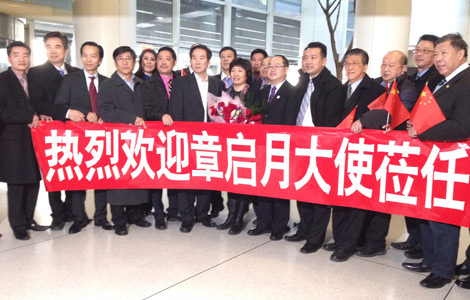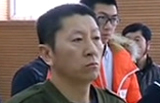Year of cooperation marks US, China relations
Updated: 2014-12-31 06:13
By Pu Zhendong in Beijing and Chen Weihua in Washington(China Daily USA)
|
||||||||
Beijing and Washington have witnessed "a rise after restraint" in their interactions this year, just two short days away amid China's more proactive actions to lay out strategic cornerstones to prop up a "major-country diplomacy" that features stabilizing neighborhood, spearheading global economic development and weaving a network of partners, analysts said.
In a year summarized at a recent ministry reception as "a harvest year for Chinese diplomacy", President Xi Jinping and the Premier conducted in total 12 overseas visits to 30 countries in 2014, including Asian neighbors, as well as countries in distant Europe, Latin America and Oceania. Through more frequent bilateral interaction, Chinese leaders have spelled out a foreign policy vision that features good neighborliness and win-win cooperation.
So far, China has built various partnerships with 67 countries and five regional organizations, illustrating the "major-country style" in a non-aligned but partner-up approach.
Chinese leaders also voiced and propagated new economic and security concepts at a series of multilateral conferences such as the Nuclear Security Summit in the Netherlands, the sixth BRICS Summit in Brazil, and Shanghai Cooperation Organization Summit in Tajikistan.
In late November, Xi highlighted China's pursuit of a "major-country diplomacy with Chinese characteristics"- namely new style and vision - on the premise of continuity and consistency of China's foreign policy, at the Central Conference on Work Relating to Foreign Affairs.
Observers said the remarks signaled Beijing's diplomatic shift from its traditional approach of "keeping a low profile" toward striving for accomplishments, given the country's status as a rising economic giant.
In particular, the two intertwined global powers of China and the US have continued to forge a new paradigm of "big country relations" in the face of disagreement and competition.
Teng Jianqun, a senior research fellow from the China Institute of International Studies, said the China-US relationship is shifting into a "new normal", a term Xi has recently adopted to describe the current stage of China's economic development.
"Despite fierce competition and frequent setbacks in traditional areas such as trade and security, China and the US have managed to avoid conflicts and seek in-depth understanding," Teng said.
Bilateral tensions stood high at the beginning of the year following futile efforts by Washington and its regional allies to thwart China's designation of its Air Defense Identification Zone (ADIZ), in the East China Sea.
To prevent China from launching a parallel in the disputed South China Sea, the US had thrown intensive objections in the first half of the year, questioning China's territorial legitimacy in relevant waters. On the other hand, Washington avidly endorsed hardline claims by Manila and Hanoi, further interfering in the disputes by calling for international arbitration and a "voluntary freeze" of provocative actions.
"In terms of South China Sea, the US is no longer satisfied with simply ‘waving flags' at the backstage, instead it is intervening with a purpose of creating regulations to its own advantage," said Wu Xinbo, executive dean of Institute of International Studies with Fudan University in Shanghai.
Hostility regarding maritime differences was evident during high-level visits to Beijing by US Secretary of State John Kerry in February, followed by then Defense Chief Chuck Hagel two months later.
During his visit to Japan in April, President Barack Obama for the first time clearly stated that the US security treaty with Japan covers China's Diaoyu Islands, manifesting Washington's increasing determination to back up Tokyo's contested stance.
A column published in the December 6th-12th edition of The Economist said China's territorial disputes are largely zero-sum, as the country's aspiration for regional leadership challenges the US naval supremacy in the Western Pacific.
"Little so far suggests that any American leader would be willing to lose," it said.
However, Cheng Li, director of the John L. Thornton China Center of the Brookings Institution, said China's adjustment in foreign policy has demonstrated a growing maturity, although the disputes will not go away.
"The wisdom of leaders, the growing interaction among nations will help make the views more mature, and leaders will get a better understanding of the framework of China-US relations," Cheng said.
Another clashing area lay in cyber security. In May, the US announced an indictment against five Chinese military officers on allegations of cyber theft. Beijing demanded the US to withdraw the "purely groundless" indictment and suspended work on a joint cyber security work group.
Cheng urged the two countries to find a way out of the cyber security issue and resume dialogue, "the early the better".
"This is a totally new area that is characterized by the fact that whoever launches preemptive strike gains huge advantage. It is hard to know where the threat comes from, it could be just a lone wolf, and the consequences of cyber attack is unimaginable," he said.
Despite sharp public disagreements, the two sides have still managed to advance substantive cooperation. The situation started to "take a clear turn for the better" in July after the sixth round of the China-US Strategic and Economic Dialogue reaffirmed joint efforts in boosting exchanges and tackling problems.
In November during the convention of the 2014 Asia-Pacific Economic Cooperation (APEC), Xi took the "home-court" opportunity in Beijing to renew their California cordiality with visiting US counterpart Obama through the signing of landmark pacts on visa extension and climate change.
Observers said the leaders of the two states might better understand each other through personal communication so as to minimize suspicion and miscalculation, and finalize cooperative deals.
"As the world's two largest greenhouse gas emitters, China and the US declaring their post-2020 reduction targets have injected ‘adrenalin' to next year's Paris Climate Convention Conference, where a binding global agreement will be adopted," said Wu, the Fudan University professor.
"We have also seen efforts from both sides to simplify visa application, fight against terrorism and corruption and advance investment treaty negotiations," he added.
Breakthroughs also took place in the military sphere, which is often marred by strong mistrust. In July, China for the first time participated in the US-led Rim of the Pacific (RIMPAC) naval exercise. Last year, the two defense authorities also established a mutual notification mechanism for major military activities and a standard of behavior for air and sea safety.
"Washington and Beijing are now in a turbulent period of seeking new interactive paradigms as a result of changes in national strength and areas of interests," Wu said.
"Identifying bottom lines for competition and further managing differences to ensure stability will be major tasks for both countries next year," he added.
Robert Daly, director of the Kissinger Institute on China and the United States at the Wilson Center, believes China and the US have the ability, as well as the expertise with the people, to manage this "complicated, mutually beneficial, and dangerous" relationship successfully.
"The US will need genuine receptivity to China as a maker of norms and the builder of institutions, while China has to be transparent and specific about its propositions," Daly said.
puzhendong@chinadaily.com.cn
- 'Miss Leisure World' candidates play war game
- Metro use drops slightly as new fare hikes kick in
- Record passenger numbers expected for upcoming chunyun
- Children step out of Daliang Mountain
- 1,000 years on, the art of fish hunting is in safe hands
- National Stadium illuminated to greet New Year countdown

 Top 10 happiest cities in China 2014
Top 10 happiest cities in China 2014
 Children step out of Daliang Mountain
Children step out of Daliang Mountain
 New Consul General of China in New York arrives at JFK
New Consul General of China in New York arrives at JFK
 Cooking lunch for Chinese construction workers
Cooking lunch for Chinese construction workers
 Ice scalers embrace stars in all their glory
Ice scalers embrace stars in all their glory
 Missing AirAsia plane maybe at sea bottom
Missing AirAsia plane maybe at sea bottom
 Chinese artists get Times Square spotlight
Chinese artists get Times Square spotlight
 Yearender: Best selling Chinese films in 2014
Yearender: Best selling Chinese films in 2014
Most Viewed
Editor's Picks

|

|

|

|

|

|
Today's Top News
Remote Canadian polar bear town arouses interest from China
Year of cooperation marks US, China relations
Xiaomi's sky-high value also comes with potential obstacles
Bright lights for Chinese artists
Expiration dates on food probed
'New normal' focus for new consul general in NY
Bodies, debris from missing plane pulled from sea
Chinatown rallies to aid slain officer's family
US Weekly

|

|







